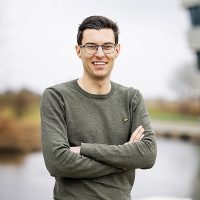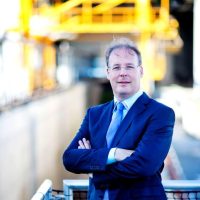How can we make our breakwaters climate-adaptive?
What is the effect of a shallow foreshore on wave overtopping in hydraulic engineering structures? Deltares is investigating this under the leadership of coastal engineering expert Menno de Ridder. In a test setup in the Deltares experimental facilities, he is testing whether a shallow foreshore can break waves before they reach a breakwater. This could be a climate-adaptive measure that helps engineers and hydraulic engineers design resilient infrastructure.

‘Until now, many tests have been conducted in wave flumes with waves coming from one direction,’ says Menno. ‘But in reality, waves at sea come from all angles. In our Delta Basin facility, we can simulate that complexity and create realistic wave fields, such as those found in the North Sea or the ocean.’
The test setup consists of a concrete slope that simulates a shallow foreshore. Menno and his team first tested waves without a breakwater, and later with a scale model of a breakwater. ‘The idea is that waves, just like on the beach, break on the shallow foreshore before they reach the structure. This reduces the impact on the breakwater itself,’ explains Menno.

Future-proof infrastructure
The research is funded from Deltares' own strategic resources and contributes to design guidelines for contractors and engineering firms. The results of his research will enable engineers and hydraulic engineers to modify or rebuild breakwaters more effectively. ‘Climate change has created a lot of uncertainty about wave conditions and sea level rise. This makes it difficult to design future-proof structures. With this measure, we hope to contribute to better solutions,’ says Menno.
In addition to practical applications, the research also offers scientific insights. ‘Some processes are difficult to model. That is why we first measure the physics in the basin. We then use that data to validate and improve our models.’
You have not yet indicated whether you want to accept or reject cookies. This means that this element cannot be displayed.
Or go directly to:
More efficient and sustainable
Menno's research is also part of a TKI project, in which knowledge institutions and companies collaborate to stimulate innovation. One of the companies participating is Van Oord. Dennis van Kester works as a coastal engineer at Van Oord and is a part-time guest lecturer at TU Delft, specialising in hydraulic engineering structures. ‘Our knowledge of wave overtopping in shallow water is still insufficient; we do not understand the physical processes involved well enough. It is clear that waves break in shallow water and that the wave force decreases, but we do not know exactly by how much. That is why the tests in the Delta Basin are so important to us.’
Currently, when designing breakwaters, we make a safe, conservative estimate and use more concrete than may be necessary, explains Dennis. ‘This new knowledge removes uncertainties, enabling us to design hydraulic structures that are more effective, cheaper and also more sustainable.’

Validating the approach
A maritime contractor such as Van Oord finds it extremely interesting that a shallow foreshore is being investigated as a climate adaptation measure. Moving sand and sediment along the coast is one of their core activities. Dennis: ‘Climate change and rising sea levels are a huge challenge, and the more knowledge we have about the natural processes of seas and oceans, the better. The data that Menno provides is extremely valuable to us. Validating the measurements with data from our projects also provides new insights.’
Simulating natural processes in Deltares' experimental facilities increases confidence in the data provided, Dennis emphasises. "Here, we bridge the gap between formulas and calculation models and practical application. The interaction between science and practice in such a project is instructive for both sides. For example, our close involvement allows us to refine the research question and you can see with your own eyes how waves behave.'
The nice thing about working in our experimental facilities is that you can simulate specific conditions of natural phenomena, making their effects immediately visible.
Menno de Ridder, researcher Coastal Structures and Waves

Consortia as drivers of innovation
Marcel van Gent, coastal engineering expert at Deltares and project leader of this TKI CLIMACS-3D project, praises the opportunities offered by TKI Delta Technology to investigate innovative solutions for climate adaptation in consortia of public and private parties. In addition to Deltares and Van Oord, TU Delft and The Weather Makers are also partners in this TKI project. ‘By raising foreshores by sand nourishment, you don't have to modify the breakwaters or dykes themselves. However, we do need to know exactly how much the wave energy is reduced and what impact this has on the amount of wave overtopping over the structures,’ says Marcel.
‘What makes this project particularly interesting is that we are combining research in physical facilities and with numerical models with complex conditions in practice,’ explains Marcel. ‘The knowledge gained contributes to methods for adapting coastal hydraulic structures to climate change. In this way, we can guarantee protection against flooding and the functioning of our vital infrastructure along the coast.’


